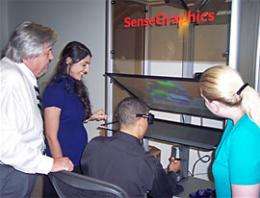Virtual Reality May Help Arm Minds for Combat

(PhysOrg.com) -- The UT Dallas Center for BrainHealth received a federal grant to fund research examining brain performance enhancement in America’s fighting men and women through the use of state-of-the-art virtual reality technologies.
The center’s study, incorporating experts from a variety of UT Dallas disciplines, will focus on maximizing brain resilience and repair in soldiers.
The cutting-edge nature of the research also holds treatment promise for patients with sports-related concussions as well as brain diseases that affect motor function (such as Parkinson’s), sensory integration (such as autism), multiple sclerosis, and many others.
The $750,000 grant is from the Health Resources and Services Administration (HRSA), a division of the U.S. Department of Health and Human Services.
BrainHealth’s HRSA-supported research will employ a highly immersive multisensory brain-training program integrating haptics (involving the body’s sense of touch and feel), vision, and audition. A robotic virtual environment (hrVR) will be used to strengthen brain performance, including building brain resilience and maximizing brain function.
BrainHealth scientists predict the grant-funded research will show that the human brain can be trained to reduce response time in incredibly stressful environments (such as the battlefield, when a soldier’s ability to react to sudden threats in fractions of a second may mean the difference between life and death). The research may also offer ways to minimize error rates, and improve decision making and adaptation to unexpected events.
The project’s research aims are to increase a soldier’s mental resilience before deployment and to treat soldiers for mild brain injuries that result in deteriorated motor performance after deployment.
“The technology of touch-enhanced virtual reality allows something that has not been available up to now: We can fully control the events, objects, and interactions in the virtual world,” said Miriam Reiner, Ph.D., professor at Technion-Israel Institute of Technology and a Center for BrainHealth collaborator. “Thus we can create ‘worlds’ that are impossible in the physical world to test performance and train participants for enhanced brain and motor responses.”
“Simultaneously, we can hook up participants to measure brain activities, autonomous responses of the body, and resulting behavior and performance. We can continuously test enhancement by looking directly at how fast information is processed in the brain, and how enhanced brain responses are translated into enhanced performance - for athletes, soldiers, or patients,” Reiner said.
“Our talented multidisciplinary team will take advantage of this cutting-edge hapto-visual virtual environment to turn what used to be science fiction into science faction,” said Sandi Chapman, Ph.D., professor, founder, and chief director of the UT Dallas Center for BrainHealth. “Our clinical research goal exploits this new technology to not only strengthen and repair brain function but also to measure and enhance human response time to make quick, performance-improving decisions whether on the battlefield, sports field, or any other field of endeavor where split-second reaction time is crucial.”
Scientists note that the up-to-the-minute technology of the hrVR system, already installed and soon-to-be programmed at the Center for BrainHealth, will allow complete control of sensory cues and events and support collection of event-related response data. The team’s expertise draws from cognitive neuroscientists, brain imaging experts, engineers, physicists, and rehabilitation specialists. The ultramodern set up will also permit EEGs to measure brain response to treatment, pupil dilation, and blood tests to analyze hormone fluctuations as a way to monitor the brain’s response and resilience to stress.
“We are very excited to partner with the Center for BrainHealth in this vitally important project,” said Mark Spong, professor and dean of the Erik Jonsson School of Engineering and Computer Science at the University of Texas at Dallas. “Our expertise in robotics and computer science, combined with the deep neuroscientific understanding at the Center for BrainHealth, have the potential to make a major impact in the treatment of people with traumatic brain injury and other cognitive impairments.”
Provided by UT Dallas












